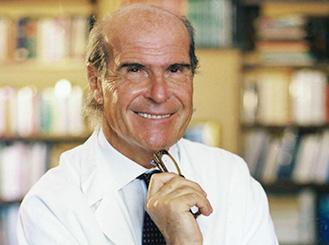Nov 10, 2016
ASCO mourns the passing and honors the life of Umberto Veronesi, MD, who passed away on November 8, 2016, at age 90.
Dr. Veronesi played a principal role in the development of breast-conserving surgery for breast cancer, establishing the quadrantectomy approach (resection of a breast quadrant, dissection of axillary lymph nodes, and radiotherapy). In 1981, he and his colleagues published the important results of a study that compared radical mastectomy with quadrantectomy in The New England Journal of Medicine. The results showed no difference in disease-free or overall survival between the two treatment approaches.
More recently, Dr. Veronesi used lymphoscintigraphy and gamma-probe–guided biopsy in patients with operable breast cancer with negative nodes to correctly predict axillary node status and avoid nodal dissection in cases where the lymph nodes were healthy. Throughout his career, he continued to research these and other breast-conservation surgical strategies. He also contributed new knowledge in the area of breast cancer prevention, conducting studies on tamoxifen and retinoids and verifying their capabilities to prevent the formation of carcinoma.
“Dr. Veronesi was a giant. He was one of the pioneers of breast-conserving therapy, as well as adjuvant chemotherapy, sentinel node mapping, and reducing radiation exposure for treatment of breast cancers,” said ASCO President Daniel F. Hayes, MD, FACP, FASCO. “Millions of patients around the world have received better, more effective, yet less harmful therapy because of his groundbreaking and visionary studies.”
In recognition of his lifelong commitment to improving the quality of life for patients with breast cancer by developing safer, less invasive surgical techniques and procedures, ASCO honored Dr. Veronesi with its Distinguished Service Award for Scientific Achievement in 2003. The award is given to individuals whose research and innovations have had a transforming and lasting impact on the treatment of cancer.
Dr. Veronesi “helped usher in the modern era of clinical research that changed practice based on high-quality evidence. He never stopped asking practical and important clinical questions that could be addressed through rigorous studies,” said ASCO CEO Clifford A. Hudis, MD, FACP, FASCO. “In that sense, he is responsible—directly and indirectly—for large numbers of dedicated investigators who followed his path and drew inspiration from his creative approaches to longstanding challenges in cancer care.”
In addition to his research career, Dr. Veronesi was active in health care policy. He served as head of the European Organisation for Research and Treatment of Cancer from 1985-1988 and as Italy’s Minister of Health from 2000-2001, where he was instrumental in promoting anti-tobacco policies.
Dr. Veronesi was born in Milan, Italy, in 1925. He earned his medical degree at Milan University in 1951 and qualified as a professor of pathological anatomy in 1958 and professor of surgery in 1961. He worked as a pathologist and then as a surgeon. From 1951-1994, he served as Scientific Director at the National Cancer Institute in Milan. In 1994, he founded the European Institute of Oncology, which he directed until his death.


Comments
Anna Potamianou, MD
Nov, 25 2016 8:19 PM
He always will inspire me, as at the first time i met him in1998, in Milan